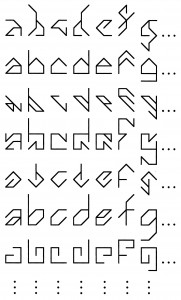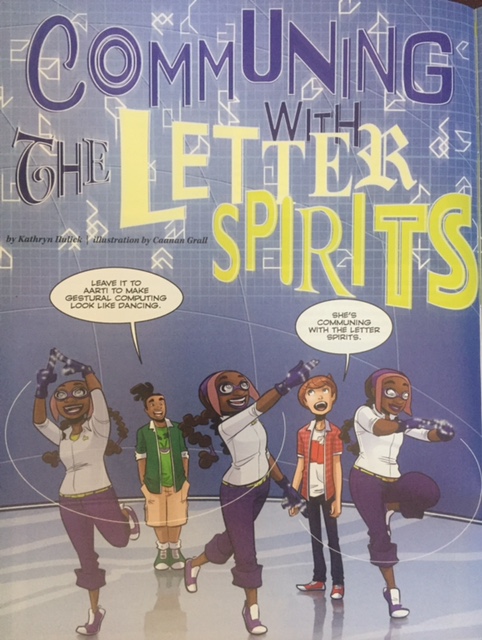A very special article just came out in Muse magazine: “Communing with the Letter Spirits.” This piece is about Douglas Hofstadter’s Letter Spirit project, which was an attempt to model human creativity through a computer program that created its own fonts. But for me, the meaning goes much deeper.

When I was a teenager, I invented my own language. Granted, I didn’t come up with a very extensive vocabulary or grammar. But I made up an alphabet, and wrote several poems in the language, all for use in a fantasy book I was working on at the time. It turns out I had more fun working on the language than on the book!
Also in high school, I read a book called Gödel, Escher, Bach: An Eternal Golden Braid, by Douglas Hofstadter. This book remains one of the top three most influential books I’ve ever read. It changed the way I thought about math and language. It revealed new ways of thinking and expressing thoughts that had never occurred to me before. I was so blown away, that I went on to read everything else Hofstadter had written.
I also continued to invent alphabets all through college. Usually these were just doodles besides whatever notes I was taking. I took a course on Sanskrit one semester, mostly to learn the script, which is still used in Hindi today. My quizzes and tests for that class looked like a secret code, but I could decipher them. In another class in college, a reading assignment included Chinese writing alongside the English translation. I spent hours puzzling over the characters, trying to figure out each one’s meaning, just for fun.
I also completed a senior scholar project — a sort of a thesis — called Thought Made Visible. The project focused on linguistics, creativity, and expression, and it took up all of my time for an entire year.

After college, I seriously considered a couple of different paths. One was going on to graduate school in cognitive science — I specifically wanted to study with Hofstadter. But in the end, I decided to join the Peace Corps. My two requests for my destination were: 1) somewhere cold and 2) somewhere with a different alphabet. I wound up in Kyrgyzstan, which is definitely cold and uses Cyrillic writing.
But I always regretted a little bit not pursuing cognitive science. I’ve always considered Hofstadter to be an important role model, but I figured I’d never get to work with him. But then the opportunity to write this article came along, and I got to talk to him. He’s in his eighties now, so I was lucky to get this opportunity while he’s still taking interviews.
It was a special conversation for me, and I’m so happy to see the article out in print! I hope some other young person who is obsessed with languages finds the article and gets the same joy out of discovering Hofstadter’s work as I did.

